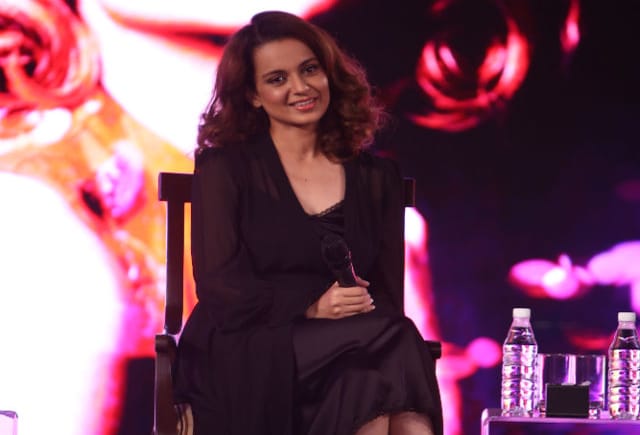
Kangana at the NDTV India Youth For Change Conclave in Delhi
New Delhi:
Actress Kangana Ranaut spoke at length about her identity and evolution at the NDTV India Youth For Change Conclave in New Delhi on Monday. The 31-year-old actress, in a session with NDTV's Ravish Kumar and her Simran director Hansal Mehta, revealed details of growing up in small town Mandi, how she rebelled against her conservative upbringing and about living life on her own terms. Kangana Ranaut grew up in Mandi, Himachal Pradesh and belongs to a conservative Rajput family in which, as she describes it, the women are expected to assume 'ghoonghat' in the presence of men and eat after the men have.
"I could never feel pride in my lineage," said Kangana Ranaut when asked about 'caste pride' and being a Rajput. The 'extreme environment' that she was brought up in was one in which her father bought toy guns for Kangana's younger brother, told him he could be a commando when grown up and Kangana that she would marry and had no need for a career; it was an environment in which Kangana was shamed for wearing a mini skirt to college in Chandigarh - phone calls would be made to her father to update him about the length of her hemline; it was an environment in which Kangana's mother was rebuked for raising a 'badtameez' girl.
"I just wanted to be free," Kangana Ranaut revealed, saying that she felt stifled at home and the she doesn't feel like she truly belongs when she goes home to Mandi. "I want to tell women that they should fight for their own dignity, be it against fathers, husbands or children," she said.
Having lived in Mumbai for over a decade now - her debut was in 2006 film Gangster - Kangana Ranaut has a unique perspective on what drives social behaviour on either side of the urban divide. "Big cities are money-oriented, small towns are more concerned about what buaji, mausiji and other people will say," she said.
It hasn't been easy for her to make it big. For years, Kangana Ranaut's fluency in English, or lack thereof, was ridiculed in Bollywood circles and the press. As she says now, she didn't think her English skills were poor and was surprised that she couldn't make herself understood. But she hired a tutor and is now considered very articulate in what is clearly a second language. "It's what is inside you that counts, not how well you speak English or Chinese or whatever," Kangana Ranaut said, also acknowledging that desi accents, like the Haryanvi one she used in Tanu Weds Manu Returns, have rarely been given respect. Actors like Irrfan Khan have helped minimise the stress on English skills, Kangana explained, admitting that there was a time when an actress who spoke no Hindi had more opportunities in Bollywood than one who spoke no English.
Watch: Kangana Ranaut in conversation with Ravish Kumar
Kangana Ranaut, winner of three National Awards, was last seen in Rangoon and is now prepping for the film Simran - Simran was also the name of the character she played in her debut, Gangster, and so is a full circle of sorts.
"I could never feel pride in my lineage," said Kangana Ranaut when asked about 'caste pride' and being a Rajput. The 'extreme environment' that she was brought up in was one in which her father bought toy guns for Kangana's younger brother, told him he could be a commando when grown up and Kangana that she would marry and had no need for a career; it was an environment in which Kangana was shamed for wearing a mini skirt to college in Chandigarh - phone calls would be made to her father to update him about the length of her hemline; it was an environment in which Kangana's mother was rebuked for raising a 'badtameez' girl.
"I just wanted to be free," Kangana Ranaut revealed, saying that she felt stifled at home and the she doesn't feel like she truly belongs when she goes home to Mandi. "I want to tell women that they should fight for their own dignity, be it against fathers, husbands or children," she said.
Having lived in Mumbai for over a decade now - her debut was in 2006 film Gangster - Kangana Ranaut has a unique perspective on what drives social behaviour on either side of the urban divide. "Big cities are money-oriented, small towns are more concerned about what buaji, mausiji and other people will say," she said.
It hasn't been easy for her to make it big. For years, Kangana Ranaut's fluency in English, or lack thereof, was ridiculed in Bollywood circles and the press. As she says now, she didn't think her English skills were poor and was surprised that she couldn't make herself understood. But she hired a tutor and is now considered very articulate in what is clearly a second language. "It's what is inside you that counts, not how well you speak English or Chinese or whatever," Kangana Ranaut said, also acknowledging that desi accents, like the Haryanvi one she used in Tanu Weds Manu Returns, have rarely been given respect. Actors like Irrfan Khan have helped minimise the stress on English skills, Kangana explained, admitting that there was a time when an actress who spoke no Hindi had more opportunities in Bollywood than one who spoke no English.
Watch: Kangana Ranaut in conversation with Ravish Kumar
Kangana Ranaut, winner of three National Awards, was last seen in Rangoon and is now prepping for the film Simran - Simran was also the name of the character she played in her debut, Gangster, and so is a full circle of sorts.
